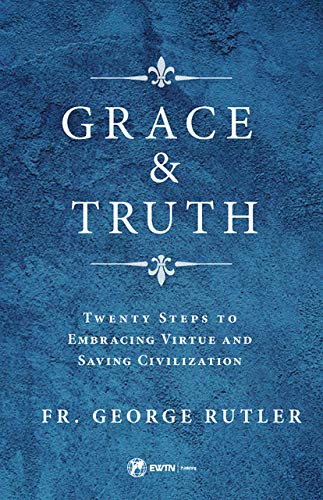How Virtues Can Save the World, According to Father Rutler
BOOK PICK: Grace Truth

GRACE & TRUTH
Twenty Steps to Embracing Virtue and Saving Civilization
By Father George Rutler
EWTN Publishing/Sophia Press, 2019
147 pages, $14.95
To order: ewtnrc.com or (800) 854-6316
The essays collected in this volume were originally television interviews on EWTN, but skillful transcription and editing has transformed Father George Rutler’s spoken words into highly readable essays that stand alone as incisive commentary about our culture’s many vices and the countercultural virtues that will save us.
The vices under Father Rutler’s scrutiny include deceit, mediocrity, contempt for innocence, intrigue, discord, sentimentality, and many others. Throughout the essays, Father Rutler returns again and again to a central theme: The root of every deliberate vice and sin is self-deception.

“The human being has a free will to chose good or evil,” he writes. “But after having plotted evil, when a person begins to commit the act itself, it begins to contradict the human dignity and the conscience in a more poignant way. This is why the most evil people in the world have had to redefine evil, pretending that it was good. … Evil always calls itself good; every vice parades itself as a form of liberation.”
The counterpoint to the vices that bedevil us are, naturally, the virtues, says Father Rutler, including humility, beauty, mirth, justice, and many others, and, most importantly courage, which he calls “the essential quality for the virtues.” Father Rutler writes in a style reminiscent of the biblical beatitudes or perhaps St. Paul’s famous hymn to charity. Here is Father Rutler singing similar praises to courage: “It takes courage to have faith; it takes courage to have hope; it takes courage to love; it takes courage to be prudent; it takes courage to act justly; it takes courage to practice temperance; and it takes courage to practice the virtue which itself is the manifestation of courage — fortitude.”
One of my favorite things about this book was the breadth of sources Father Rutler drew upon — classic figures such as Archimedes, Horace and Cicero; saints and saints in the making, such as St. Louis IX of France and John Henry Newman, respectively; authors such as Jonathan Swift and Flannery O’Connor; acclaimed scientists such as Albert Einstein; figures of popular culture such as Sir Alec Guinness; and even monarchs such as King George VI of England.
Some of the best anecdotes, however, feature anonymous people who perfectly embody the virtues. For instance, Father Rutler tells this story about 9/11:
“In one of the subway stations, smoke was blinding people as they tried to work their way up the stairs to fresh air,” he writes. “They had no idea what was going on at first, and they panicked because they were temporarily blinded by the harsh smoke. One man raised his voice to them to calm down. He took each one of them by the hand and led them up the stairs to safety, by a route only he knew — more precisely, a route only he and his seeing-eye dog knew. Day in and day out, these commuters has seen that man and pitied him for his blindness. But in that crisis, he was the only one who could see.
“It reminded me of how many times in the history of the saints that people had pitied them for some reason or another, thinking that they had missed out on the joy of life or had denied themselves too many pleasures, only to find out in the end that the saints were the only ones who could really see.”
Also poignant are the anecdotes that feature individuals with whom Father Rutler was intimately acquainted and who perfectly embody the virtues that serve as the framework for his book. For example, Father Rutler lovingly tells the story of how his father rescued a damaged crucifix from a trash heap. To repair it, he first fashioned a new cross. But, when it came time to affix the corpus to the cross, he unknowingly gave his son, the priest-to-be, an unforgettable lesson in pious devotion: “He did not notice me one night going by his workbench when he was putting the corpus on the new cross he had built,” Father Rutler writes. “While he nailed Christ to the cross, he … put a handkerchief over the figure. That was a subtle victory for the Lord being fought by my father. There was an exquisite piety, as a religious virtue, expressed there. We often speak so easily and even blithely about the Crucifixion, but my father could not bear even to drive tacks into a clay figure of Our Lord. Each one of us is engaged in this spiritual warfare, and each one of us is being tested each day. There is no cause more just than that of Christ.”
This latest offering by Father Rutler is a lovely book, wide-ranging in its topics and perhaps a bit rambling — but I quite enjoyed that part of it, actually. The conversational style of these essays drew me in and kept me reading.
Clare Walker writes from Westmont, Illinois.

















